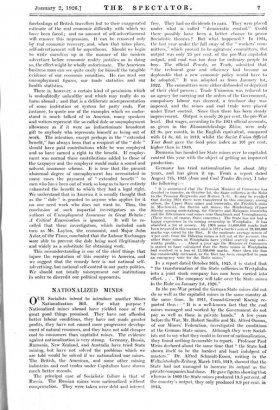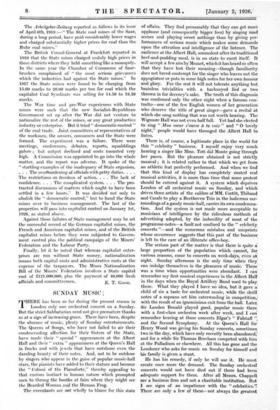NATIONALIZED MINES
OUR Socialists intend to introduce another Mines Nationalization Bill. For what purpose ? Nationalized mines abroad have yielded none of the great good things promised. They have not afforded better labour conditions, they have not made greater profits, they have not caused more progressive develop- ment of natural resources, and they have not sold cheaper 'coal to consumers than capitalist mines. The evidence against nationalization is very strong. Germany, Russia, Rumania, New Zealand, and Australia have tried State .mining, but have not solved the problems which we are told would be solved if we nationalized our mines. The British, the American, and some other mining .industries and coal trades under Capitalism have shown much better records.
The principal case of Socialistic failure is that of Russia. The Russian mines were nationalized without . compensation. They were taken over debt and interest free. They had no dividends to earn. They were placed under what is called "democratic control." Could there possibly have been a better chance to prove Socialistic theories ? But what happened ? In 1921, the last year under the full sway of the " workers' com- mittees," which proved to be agitators' committees, the output was only 25 per cent. of the pre-War capitalist output, and coal was too dear for ordinary people to buy. The official Pravda, or Truth, admitted that "the technical gear and efficiency had become so deplorable that a new economic policy would have to be adopted." It was adopted as from January 1st, 1922. The committees were either disbanded or deprived of their chief powers ; Trade Unionism was reduced to an agency for carrying out the orders of the Government, compulsory labour was decreed, a ten-hour day was imposed, and the mines and coal trade were placed under Trust control. Since then there has been steady improvement. Output is nearly 50 per cent. the pre-War level. But wages, according to the 1924 official accounts, as given in the Ekonomitcheskaga Zhizn, were only E2 9s. per month, in the English equivalent, compared with £4 3s. 6d. in 1913, whilst the Soviet Union Official Year Book gave the food price index as 107 per cent. higher than in 1913.
Rumania has handed her State mines over to capitalist control this year with the object of getting an improved production.
Germany has tried nationalization for about fifty years, and has given it up. From a report dated August 7th,. 1925 (Iron and Coal Trades Review), I take the following :— " It is announced that the Prussian Minister of Commerce has decided to transfer, on October 1st, the State collieries in the Ruhr to the Prussian Bergwerks and Hutton A.-G. It may be recalled that during 1924 there were transferred to this company, among others, the Upper Harz mines and ironworks, the Friedrich mine in Mischowitz, the Stettin salt mines, the Hindenburg (Upper Silesia) mining undertaking, the Gleiwitz and Malapane ironworks and the Ibbenburen coal mines near Osnabruck and VersinghauSen. (These were, of course, State .concerns.) The State has not had a happy experience in its mining ownership in Westphalia. It has absorbed a lot of money. By 1908 some 55,000,000 marks bad been invested in this manner, and in 1912 a further sum of 19,400,000 marks was voted by the Diet. If the moderate average return of 4 per cent. from the Hibernia mines is left out of the account, the other State mines in Westphalia have yielded scarcely any note- worthy profits. . . . About a year ago the Minister of Commerce is stated to have calculated that the State mines in Westphalia had resulted in a loss of 12,500,000 marks. Since then the loss has considerably increased, as the Diet has been compelled to pass an emergency vote for the Ruhr mines."
In a report dated October 30th, 1925, it is stated that "the transformation of the State collieries in Westphalia into a joint stock company has now been carried into effect. . . . The company will take over the State mines in the Ruhr on January 1st, 1926."
In the pre-War period the German State mines did not do so well as the capitalist mines in the same country at the same time. In 1911, Consul-General Koenig re- ported thus :—" It is a well-known fact that the coal mines managed and worked by the Government do not pay as well as those in private hands." A few years before the War, Mr. Robert Smillie and Mr. Alfred Onions, of our Miners' Federation, investigated the conditions at the German State mines. Although they were Social- ists out to say what they could in favour of nationalization, they found nothing favourable to report. Professor Paul Weiss declared about the same time that "the State had shown itself to be the hardest and least indulgent of masters." Dr. Alfred Schmidt-Essen, writing in the Weltwirtsehafts-Zeitung, March 14th, 1919, showed that the State had not managed to increase its output as the private companies had done. He gave figures showing that whereas in 1860 the State mines produced 19.5 per cent, of the country's output, they only produced 8,9 per cent. in 1913. The Arbeitgeber-Zeitung rep' orted as follows in its issue of April 6th, 1919 :-L-" The State coal mines of the Saar; during a long period, have paid considerably lower wages and charged substantially higher 'prices for coal than the Ruhr coal mines."
The British Consul-General at Frankfort reported in 1910 that the State mines charged unduly high prices in those districts where they held something like a monopoly. In the same year the Chamber of- Commerce of Saar- brucken complained of "the most serious grievances which the industries had against the State mines." In 1917 -the State mines. were found to be charging from 15.60 marks to 20.00 marks per ton for coal which the capitalist Coal Syndicate was selling for 14.50 to 18.50 marks.
The War time and pre-War experiences with State mines were such that the new Socialist-Republican Government set up after the War did not venture to nationalize the rest of the mines, or any great productive industry or enterprise. But it tried" democratic control" of the _coal trade. Joint committees of representatives of the workmen, the owners, consumers and the State were formed. The experiment was a failure. There were meetings, conferences, debates, reports, squabblings galore ; but output declined and costs mounted very high. A Commission was appointed to go into the whole matter, and. the report was adverse. It spoke of the "startling examples of the inadequacy of State organism. . . . The overburdening_of officials with petty duties. The restrictions on freedom of action. . . . The lack of confidence. . . . The complicated system. . . . The pro- tracted discussions of matters which ought to have been settled in a, few hours." It was decided not only to abolish the "democratic control," but to hand the State mines over to business management. The last of the properties will pass into capitalist control on January 1st, 1926, as stated above.
Against those failures of State management may be set the successful record. of the German capitalist mines, the French and American capitalist mines, and of the British capitalist mines before they were subjected to Govern- ment control plus the political campaign of the Miners' Federation and the Labour Party.
Finally, let it be noted that whereas capitalist enter-, prises are run without State money, nationalization means both capital costs and administrative costs at the expense of the taxpayers. The Mines Nationalization Bill of the Miners' Federation involves a State capital cost of 1121,000,000, plus the payment of 40,000 fresh











































 Previous page
Previous page